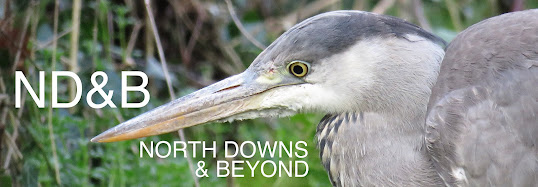Mike Netherwood
I first met Mike Netherwood at Beddington Sewage Farm in early 1975, me being an ultra-keen and ultra-green 16-year old birder, he some 20 years my senior. Mike, together with Ken Parsley, were the remnants of a once much larger ringing group which carried out the trapping and ringing of birds across the open expanse of the sewage farm. Whenever I bumped into them, which I often did, they would both tolerate my many questions about what they had seen and trapped and listen to me waxing lyrical about my own observations. Over the coming months they showed me how they caught the birds, allowed me to witness the ringing and measuring of them and, if I were very lucky, allow me to help them out by holding mist-net poles, carrying bird bags or writing down (scribing) the data that they were collecting into notebooks. By the summer of 1976 I had joined them, proudly in possession of my trainee ringer's permit.
For the next three years (until I 'defected' to Dungeness) I spent many, many hours in Mike's company. We both looked back on this period of time with great affection. Back then Beddington was still an old-fashioned sewage farm - open fields that were regularly flooded, mature hedgerows between the banked settling beds, culverts and brick out-buildings that had been built in the late 19th century, stands of willow, poplar and elm - and you could wander the site as truly believe that you were in the middle of the Sussex or Suffolk countryside. For both of us, being sensitive souls, this was a place of peace and a balm to the outside world. Mike liked nothing better than meeting up on a mid-Summer weekday afternoon (he was a postman so was well disposed to do so) when the Swifts were flying low over the settling beds and catch them in the mist-nets by 'flicking'. This trapping method had been devised by the Beddington ringers of old, and needed the pole at each end of the mist net to be held horizontally low until a Swift flew towards it. In unison the net would then be brought up into a vertical plane, intercepting the Swift. By this method we caught hundreds.
In between net rounds, or on days when we wandered the farm purely birding, we would chat away, subjects as various as the species we were observing. We both had a love of music and art, sometimes Mike would share with me his latest sketch or painting. We also shared a similar sense of humour. There were times when his ability to convey information about birds was magical. Almost fifty years after he imparted such nuggets to me they remain fresh in the memory - his rendering of the call of a Spotted Redshank and description of a Lesser Whitethroat were so accurate that when I came across both species soon afterwards - for the first time - I knew exactly what they were. Among our diet of commoner birds being trapped were a couple of standout highlights. On 10th October 1976, from a single-panelled mist-net placed in a settling bed full of Fathen, we caught a first-winter Bluethroat (pictured by Mike, above). Then, a couple of years later during an influx of Short-eared Owls (we recorded 12 on a single day) we extracted one from a mist-net.
Mike didn't keep himself to Beddington. He developed a love of Dorset, having holidays at Burton Bradstock (where he trapped two Bluethroats in the same net one morning) and then a regular autumn stay at Portland Bill Bird Observatory. And, like many Beddington-boys before him, took the road south to Dungeness. After Ken died, Mike became the custodian of the Beddington Ringing Group, teaming up with Mick Cook to carry on the work that had been started many years before. They concentrated their efforts in the Storm Tanks, away from the increasing disturbance that was now widespread across the farm as it morphed from sewage works into landfill. They had much success, and even a few surprises, such as a Wryneck and another Bluethroat - a first-year male on August 3rd 1997 that was incredibly re-trapped on June 13th 1999 - a white-spotted bird that held territory until last being seen on July 10th. There was a resurgence in the ringing group a few years later of which Mike was at the forefront. One of the notable achievements of this period was the monitoring of nest-boxes and ringing of the Tree Sparrow broods that had been hatched within them. Between 1992 and 2006 over 5,000 were ringed. This colony is now, sadly, extinct.
In later life Mike suffered mobility issues and increasing ill-health. He was still able to get out in the field owing to the kindness of friends. We kept in contact via social media, the odd phone call and I last saw him at the end of last year, for a lunchtime gathering of 'Beddington Old Boys' in The Hope pub in Carshalton. Regardless of his need to be on oxygen, his appetite for life was there to see and the twinkle remained in his eyes. I had much to thank him for and made sure that he knew how I felt about him. I'm so pleased that I got the chance to do so. He was as kind, generous and content a man as you could wish to meet. I cannot remove Mike from Beddington and Beddington from Mike when I think back to those golden days of the 1970s and certainly wouldn't want to do so. They were magical times. Farewell friend.



Comments
I always felt at ease around him and he seemed to me the absolute essence of a good ringer: knowledgeable and enthusiastic, with high standards but just enough patience.
Rest In Peace Mike.